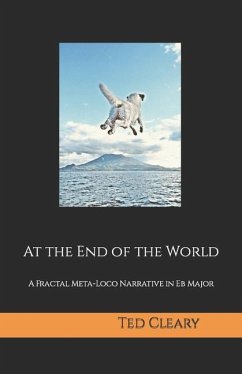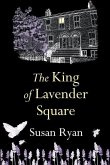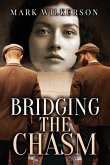Praise for At the End of the World: "This is intensely good writing, overflowing with raw artistry." - James Howard Kunstler "If Hieronymus Bosch came back to write a novella, it might look like this." - The Phoenix "Hats off - this is fine stuff - just right for our apocalyptic age. I was reminded of early Pynchon in a very good way - it's terrific. All the characters are strong. And such economical writing with constant dashes of rhetorical brilliance. It's never overwritten -- a difficult balance to maintain, impossible for most writers." -- Eumaeus Jones, Ph.D. A psychedelic and picaresque romp through philosophy, jazz, and a plausible end-of-the-world scenario, this tight novella spins interwoven story-lines, draws you down corkscrewing rabbit holes, lifts you back to open air -- and finally catapults you (along with "Dean the saxophone player") into realms strange and alluring. In a flamboyant yet succinct style recalling the crisp turns of T.C. Boyle, supercharged with a whiff of Vonnegut, and a distant cousin to the crisply exact comic articulation of Flann O'Brien ( - merely comparisons for reader orientation, not claims of literary peerage - ) the reader is in for a high octane and entertaining trip. Greatly compressed, it packs the punch of an entire novel into the M-80 cylinder of a short novella. For readers lacking time (and that is all of us), this quick in-and-out literary head-trip may be just the thing. Excerpt: Brother Mark, standing on the parapet, saw the masses surge up the hill and smash themselves like the sea against the foot of the cliffs. In them he saw, across over a thousand years, the Vikings sacking the rocky outposts of Ireland, greasy and stinking, gorged on meat and the plunder of Irish hamlets. In their ships huddled captive girls in thrall for the long northern haul across kraken-swirled waters to womanless Iceland. >The monks were hard men but poor warriors; half-mad from the rain and half-blind from copying in the dim light of candles, they were no match for the Norsemen. They perceived the intruders to be a riot of evil set loose in the world to be tamed by prayer or perhaps appeased by offerings of boiled fish and chives. The Vikings swatted away their frugal bowls and split the godly men from skull to pelvis with their battle axes. Brother Mark watched as the marauders scaled the monastery walls, broke through the gates, and infiltrated the cloister. Nothing had changed in over a thousand years: it was still the same uneven match between good and evil. The earth had circled the sun for a human eternity, describing its orbit through the ebony void; empires had risen and fallen; forty generations had been begotten and forgotten, and here was Brother Mark on the spume-soaked skellig, hearing the awful din of voices and clashing metal, the tramping of boots and promise of mayhem. "Get a load of Scarface here." >------ Also see "Look Inside" feature for the opening pages. Contains bonus story, "Drew's War: A Vietnam Tale." ("Like Apocalypse Now on nitrous oxide and psilosybin." -- Green Room, Surf Zine) Praise for Ted Cleary's novella, Song of the Cicada ("Flushing Araby"): "The prose has a wildness and lushness reminiscent of the Joyce of Ulysses, or maybe Flann O'Brien or Rushdie ... Phantasmagoric." -- Matthew Wikander, Distinguished Prof. Emeritus of English, Univ. of Toledo "Marvelous. A gem on every page. The Kama Sutra sequence is a gasping fictional moment." -- Michael Seidel, Prof. Emeritus of English, Columbia University; author of James Joyce: A Short Introduction.
Bitte wählen Sie Ihr Anliegen aus.
Rechnungen
Retourenschein anfordern
Bestellstatus
Storno





